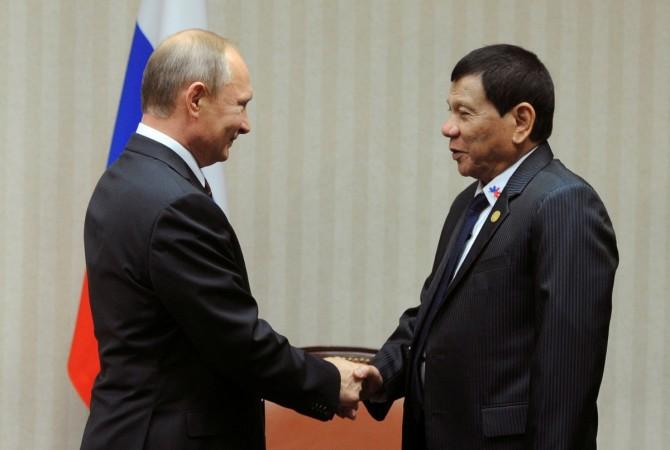
Something is amiss in South-East Asia, and it shouldn't sit well in the Beltway.
The latest reports have stated that the Russians have sent two warships to the Philippines on a goodwill tour (yup, that's what they're calling it these days) ostensibly to impart anti-terrorism tips to the Filipino navy.
China's new stealth fighter FC-31 has to beat these combat jets to rule the skies
Sure, one's an anti-submarine ship (the terrorists love those suicide subs) and the other's a tanker, but that doesn't make the tour's real aim any less obvious.
As President Rodrigo Duterte flutters his eyelashes at China, Russia and its macho president Vladimir Putin are all up for a geopolitical ménage à trois.
Duterte has made no bones about his antipathy towards outgoing US President Barack Obama (he of the "son of a whore" infamy) and has since made numerous comments that signal his country's pivot away from the US, towards countries more inclined to give the president a pass when he claims he's to drug users what Pol Pot was to...well...humans.
While Billy Joel might not feel that 'Russians in the Philippines' might warrant a line in a new current affairs chart-topper, it still gives one pause for thought.
It's easy to understand why the Chinese are wooing Duterte. If the Philippines finally agrees to domestically accept China's sovereignty of the Spratly Islands (the UNCLOS be damned!) there's a high chance that countries like Vietnam will think twice before challenging Chinese claims to the numerous islands in the South China Sea.
Russia's ambitions, however, are a little more ambiguous. There may well be a covert concerted effort by both Russia and China to not so much destabilize the region, but rather restabilize it in their favour, seeing as the incoming US president Donald Trump could be increasingly isolationist.
Russia may also fear Trump cutting South-East and East Asia loose from the US's protective net, thereby allowing China to move in as lord and savior and exponentially increase its diplomatic and military heft in the region.
The wildcard here is the role India will play, especially in respect to Vietnam. Long seen as a makeshift counterweight to China's considerable military might, India has been testing the waters with Vietnam – a country increasingly alarmed at China's growing influence in the region.
A close India-Vietnam alliance may still be too weak to act as a countermeasure to Chinese plans, but it could provide a rally point for other smaller regional nations to run to should the dragon start breathing fire.
As for the Russians, right now they're occupied in Syria. And as long as their exit strategy is flexible enough to prevent another Afghan disaster, South-East Asia could well streak up their geopolitical agenda.
Expect soft diplomacy from them in the region though as they bring out a trough of carrots, all the while keeping an eye on China's growing stick.

















